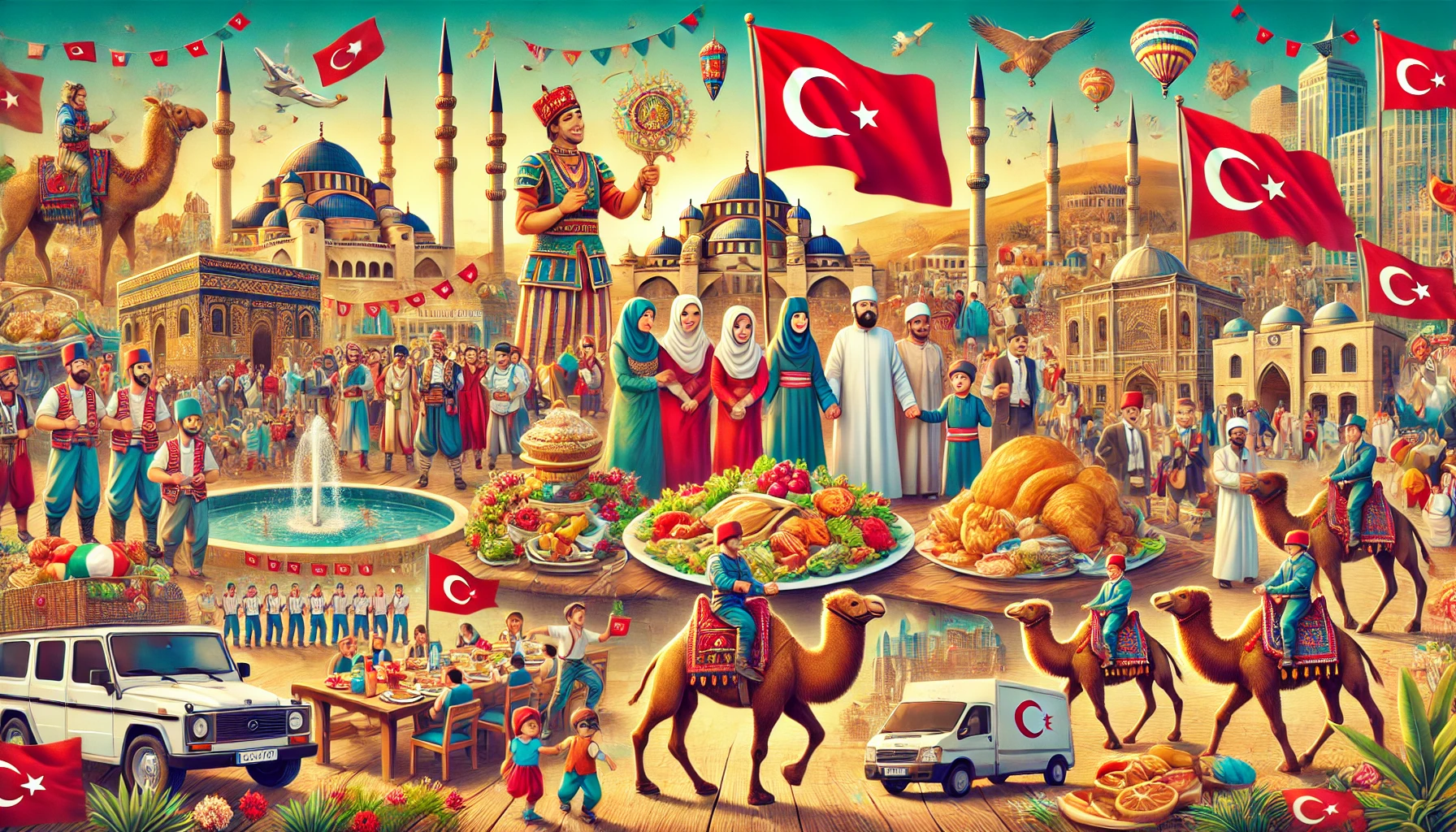Celebrations in Turkey: National and Religious Holidays
National and religious holidays are celebrated with great enthusiasm in Turkey every year. These occasions bring people together to honor traditions, celebrate cultural heritage, and enjoy festive activities. Religious holidays, in particular, are observed at different times each year according to the Islamic lunar calendar.
Religious Holidays
Ramadan Feast (Eid al-Fitr)
The Ramadan Feast, known as “Ramazan Bayramı” or “Şeker Bayramı” in Turkish, marks the end of Ramadan, the holy month of fasting. This year, the Ramadan Feast is celebrated from August 8 to 10, 2013. The holiday is characterized by joyful gatherings, feasts, and the exchange of gifts and sweets. Families come together to share special meals, and it is a time for charity and helping those in need.
Key Traditions:
- Eid Prayers: Special prayers are held in mosques across the country on the morning of the first day.
- Feasting: Families prepare and enjoy elaborate meals, often featuring traditional dishes and sweets like baklava and Turkish delight.
- Visiting Relatives: It is customary to visit relatives, friends, and neighbors, bringing gifts and sweets.
- Charity: Acts of charity, known as “zakat al-fitr,” are performed, with donations given to the less fortunate.
Sacrifice Holiday (Eid al-Adha)
The Sacrifice Holiday, or “Kurban Bayramı,” commemorates the willingness of Prophet Ibrahim (Abraham) to sacrifice his son as an act of obedience to God. This year, the Sacrifice Holiday is celebrated from October 15 to 18, 2013. The holiday involves the ritual sacrifice of an animal, usually a sheep, goat, or cow, with the meat distributed among family, friends, and those in need.
Key Traditions:
- Sacrifice: The ritual sacrifice of an animal is performed, with specific religious rites and prayers.
- Distribution of Meat: The meat from the sacrifice is divided into three parts: one-third for the family, one-third for friends and neighbors, and one-third for the poor and needy.
- Feasting: Similar to the Ramadan Feast, families gather to enjoy special meals and celebrate together.
- Charity and Giving: Acts of charity are emphasized, with efforts made to ensure that everyone can partake in the celebrations.
National Holidays
In addition to religious holidays, Turkey celebrates several national holidays that honor its history and cultural heritage.
Republic Day (October 29)
Republic Day, celebrated on October 29, marks the anniversary of the founding of the Turkish Republic in 1923. The day is marked with ceremonies, parades, and various cultural events. It is a time of national pride and remembrance of Mustafa Kemal Atatürk, the founder of modern Turkey.
National Sovereignty and Children’s Day (April 23)
April 23 is celebrated as National Sovereignty and Children’s Day, a holiday dedicated to children and the establishment of the Turkish Grand National Assembly in 1920. The day features performances by children, cultural activities, and official ceremonies. Schools and communities organize events to celebrate the importance of children and the nation’s sovereignty.
Victory Day (August 30)
Victory Day commemorates the victory in the Battle of Dumlupınar during the Turkish War of Independence in 1922. Celebrated on August 30, the day includes military parades, ceremonies, and patriotic displays. It is a tribute to the Turkish Armed Forces and the nation’s independence.
Local Festivals and Special Days
In addition to national and religious holidays, Turkey hosts a variety of local festivals and special days celebrated on a smaller scale. These events often highlight regional traditions, cultural practices, and local arts and crafts.
Examples of Local Festivals:
- Camel Wrestling Festival: Held in various regions, this unique festival features camel wrestling matches, traditional music, and dancing.
- International Istanbul Film Festival: Celebrating cinema, this festival showcases films from around the world and includes screenings, workshops, and panel discussions.
- Hidrellez: A spring festival celebrated on May 5-6, marking the arrival of spring with outdoor festivities, dancing, and music.
Conclusion
Turkey’s rich cultural heritage is reflected in its enthusiastic celebration of national and religious holidays. From the solemnity of religious observances during Ramadan and Eid al-Adha to the patriotic pride of Republic Day and Victory Day, these holidays bring people together to honor their history, traditions, and shared values. Additionally, local festivals and special days offer a glimpse into the diverse and vibrant cultural landscape of Turkey.
Latest Update: May 22, 2015
Your Content Goes Here
A brief summary of the key points in this article.




